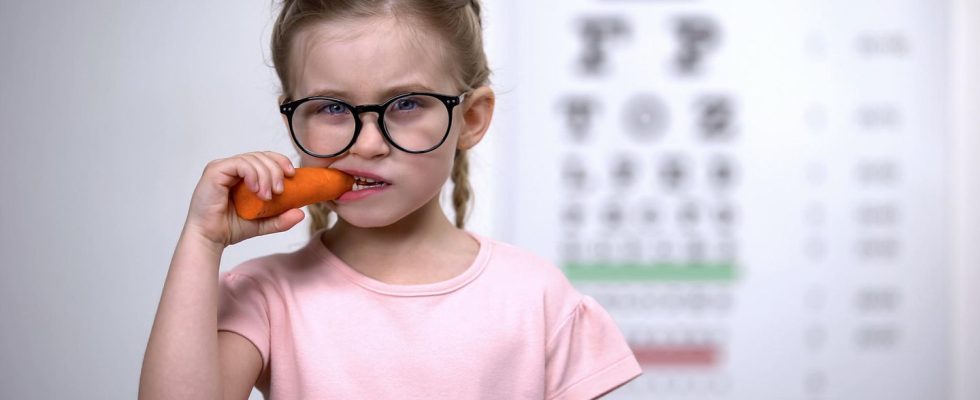myth check
Carrots are good for the eyes – which is the truth of the myth
Even those who eat a lot of carrots will not be able to do without glasses.
© Motortion / Getty Images
Carrots are said to be good for the eyes. But can the vegetables affect vision or even alleviate poor eyesight? We explain what the myth is about.
Rabbits munch on carrots all the time. Very few of us are likely to know short-sighted rabbits, but the animals cannot go to the optician either. But back to the carrots. Every child has probably heard: “Eat more carrots, they’re good for the eyes!” But is that just a trick by the parents so that their sons and daughters like to reach for carrots or is there something to the sentence?
It is true that carrots contain a lot of beta-carotene. Our body uses it to make vitamin A. The vitamin fulfills important tasks in our body – we need it to build up the skin, the mucous membranes and the blood. The vitamin is also important for our retina. In the rods and cones of the retina, light is converted into a signal that is sent to the brain.
Vitamin A is important for the retina
So vitamin A helps people see in low-light conditions, Emily Chew, associate director at the US National Eye Institute in Bethesda, Maryland, told Spectrum. If the body does not have enough vitamin A available, this can lead to the detachment of the cornea.
That means: Vitamin A is important for our night vision. However, to what extent eating carrots can improve forbearance is not clear. In a 2005 study with pregnant women, researchers examined how eating boiled carrots six days a week compared with other foods containing vitamin A and taking vitamin A supplements affected night vision. The foods scored the same and the vitamin A supplement slightly better. The result: Eating carrots resulted in the night vision of the pregnant women being at a normal level. So no evidence that eating carrots actually improves night vision.
nutrient
Ciao, gray hair: 10 foods that protect against graying
Carrots cannot alleviate poor eyesight
So nobody has to eat tons of carrots for the eyes. Because: An oversupply of vitamin A can neither improve vision nor alleviate visual impairment. Only a vitamin A deficiency would be dangerous, this can lead to blindness. In Germany, however, healthy people do not have such a large vitamin A deficiency that it would affect their vision.
Conclusion: Vitamin A is important for the retina and many functions in our body. But carrots have no effect on our eyesight. However, a vitamin A deficiency can lead to blindness. But beta-carotene is not only found in carrots, but also in sweet potatoes, pumpkin and red peppers. And there is a lot of vitamin A in liver or eel.
Sources: Study,spectrum, DAC, Canton Hospital Winterhur


